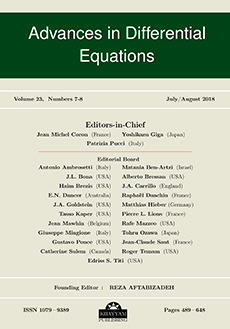Adv. Differential Equations 6 (2), 129-154, (2001) DOI: 10.57262/ade/1357141491
KEYWORDS: 35J60, 35A05, 35B05, 35J65, 35P30
We study the existence, nonexistence and exact multiplicity of positive radial solutions of the problem: $- \Delta u = f(u) $ in $ B(R_1, R)$, where $ R_1 > 0 $ is a fixed real number and $ B(R_1,R) \subset \mathbb R^n (n \geq 3) $, $ R > R_1 $, is an annulus, for the following boundary conditions: (1) $ u = 0 $ on $ \partial B(R_1,R) $. For $ f(t) = t^p - t^q $, $ 1 < p < q $ and $ p \leq (n+2)/(n-2) $, there exist $ R_0 \geq \tilde{R} > R_1 $ such that the problem admits exactly two solutions for $ R > R_0 $ and no solution for $ R < \tilde{R}$. (2) $ u = 0 $ on $ |x| = R_1 $ and $\partial u/ \partial \nu = 0 $ on $ |x| = R $. (a) For $ f(t) = t^p - t^q $, $ 1 < p < q $ and $ p \leq (n+2)/(n-2)$, there exists $ R_0 > R_1 $ such that the problem admits exactly two solutions for $ R > R_0 $, exactly one solution for $ R = R_0 $ and no solution for $ R < R_0 $. (b) Let $ f^{\prime}(t)t > f(t) $. If $ f(t) > 0$ for $ t > 0 $, then the problem admits at most one solution for any $R > R_1 $. For a large class of nonlinearities $ f $ changing sign (for example $ f(t) = t^p -t $), there exists $ R_0 > R_1 $ such that the problem admits a unique solution for all $ R < R_0 $. These results have been proved by analyzing the behaviour of the first and the second variations of $ u(\gamma,r) $, the unique solution of the corresponding initial value problem with $ u^{\prime}(R_1) = \gamma > 0 $, with respect to $ \gamma$ together with an identity (2.8) which may be regarded as variations of the generalized Pohozaev's identity with respect to $ \gamma $.

